Hyundai Motor Group, Korea’s leading automaker, has also begun to expand its used car business in earnest. Both Hyundai Motor Company and Kia have added “real estate development” to their new business objectives, signaling their intention to expand in the used car sector. This move is interpreted as a step beyond their previous focus on online certified used car businesses, laying the groundwork for large-scale used car sales and collection facilities.
Hyundai Motor Company added real estate development to its business objectives at its regular shareholders’ meeting last year, while Kia did the same at its meeting this year.
After launching its online certified used car business at the end of 2023, Hyundai Motor Company established massive reconditioning centers in Yongin, Gyeonggi Province, and Yangsan, South Gyeongsang Province, and opened a center in Gunsan, North Jeolla Province, in August last year.
At the regular shareholders’ meeting in March, Kia President Song Ho-seon explained the addition of new business objectives, stating, “This is to develop new business sites such as integrated flagship stores for vehicle purchase, maintenance, service, and brand experience for customers.”
Another Hyundai Motor Group affiliate, Hyundai Glovis, is also expanding its used car purchasing service nationwide this year. Through its own platform, “Autobell,” it is collaborating with car-sharing company SOCAR to dispatch professional evaluation consultants to the customer’s desired time and place, providing vehicle inspection and purchasing services.
The reason Hyundai Motor Company and Kia are expanding their used car businesses is that the used car market has already surpassed the new car market in size. Especially as more consumers seek practical value amid economic downturns, attention is shifting to used cars with similar specifications at relatively lower prices.
According to automotive data platform Carisyou Data Research Institute, the number of used car transactions in Korea last year was 2.43 million units, far exceeding the 1.63 million new car transactions.
The image of the used car market is also changing significantly. Traditionally, the used car market was notorious as a classic “lemon market.”
A lemon market refers to a market where sellers monopolize information such as vehicle mileage and condition, resulting in severe information asymmetry for consumers. In such a structure, if sellers provide inaccurate product information, consumers inevitably suffer losses.
For this reason, there has long been strong demand among consumers for conglomerates to enter the market. When Hyundai Motor Company and Kia began to enter the used car market in earnest, online communities were filled with comments such as, “Used car dealers who have deceived consumers are in trouble now,” and “Even if it’s a bit more expensive, I’ll trust and use a conglomerate’s used car.”
After the ban on conglomerate entry into the used car market was lifted in 2022, Hyundai Motor Company and Kia entered the market at the end of 2023. At the time, both companies stated, “We are preparing to enter the used car market with consumer protection and trust enhancement as our top priorities,” and explained, “We will improve the overall quality and performance of used cars, enhance market trust, and promote various collaborations with the existing used car industry so that the used car industry can expand beyond sales to new business areas.”
However, out of consideration for small used car businesses, they initially sold only certified used cars online-vehicles within five years of release and under 100,000 kilometers in mileage. Additionally, to minimize the impact on small dealers, the government recommended that Hyundai Motor Company maintain a 4.1% market share and Kia a 2.9% share in the used car market.
Due to these limitations, Hyundai Motor Company and Kia found it difficult to aggressively expand in the used car market, but with the lifting of these regulations this month, they are now able to expand their used car businesses.
Meanwhile, not only Hyundai Motor Company and Kia but also other domestic automakers such as KG Mobility, as well as imported car companies including the German “Big Three” (Mercedes-Benz, BMW, Audi), are actively seeking to increase their market share.
New competitors are also emerging.
Recently, BYD, a Chinese company focusing on electric vehicles, announced its entry into the Korean used car market this year by establishing a new subsidiary. With competitively priced electric vehicles as its main offering, the company aims to capture a niche market with high cost-effectiveness.
Not only automakers but also rental car companies are intensifying competition in the used car market.
Lotte Rental, Korea’s largest rental car company, opened its first used car sales center in Gangseo-gu, Seoul, in November last year, followed by a second center in Bucheon, Gyeonggi Province, last month. Lotte Rental stated, “We plan to open additional centers in the Seoul metropolitan area in the first half of this year,” and set a target of selling 9,000 used cars this year, with a goal of 43,000 annual sales by 2028.
SK Rent-a-Car has also chosen the used car business as an expansion strategy. In July, SK Rent-a-Car will open its first used car auction house for dealers in Cheonan, South Chungcheong Province. Imported car dealer Kolon Mobility plans to launch online sales of imported used cars, including BMW, Volvo, and Audi, in the third quarter of this year, leveraging its imported car infrastructure.
Kim JaeHun (rlqm93@fntimes.com)










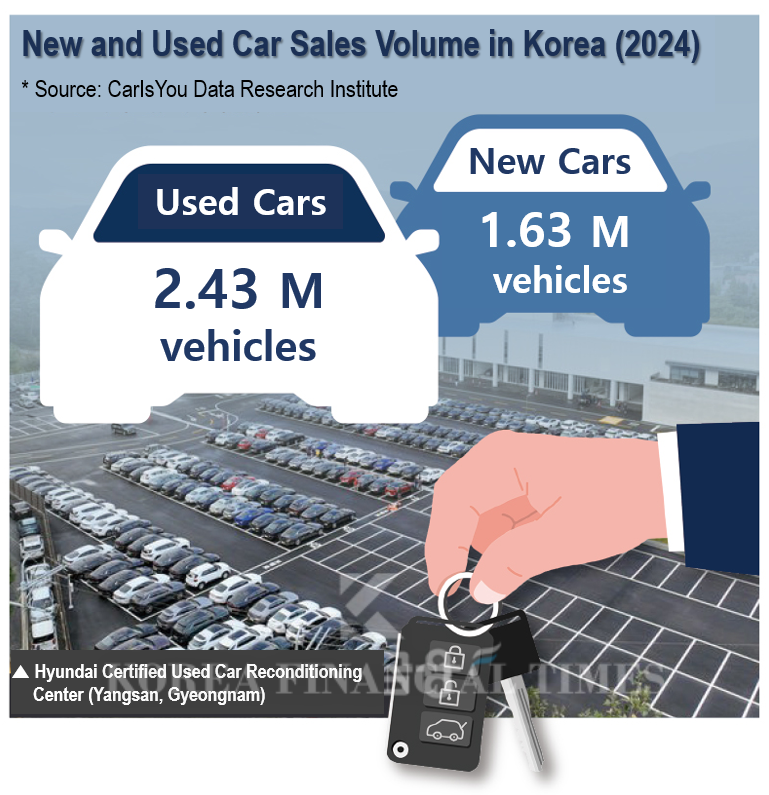
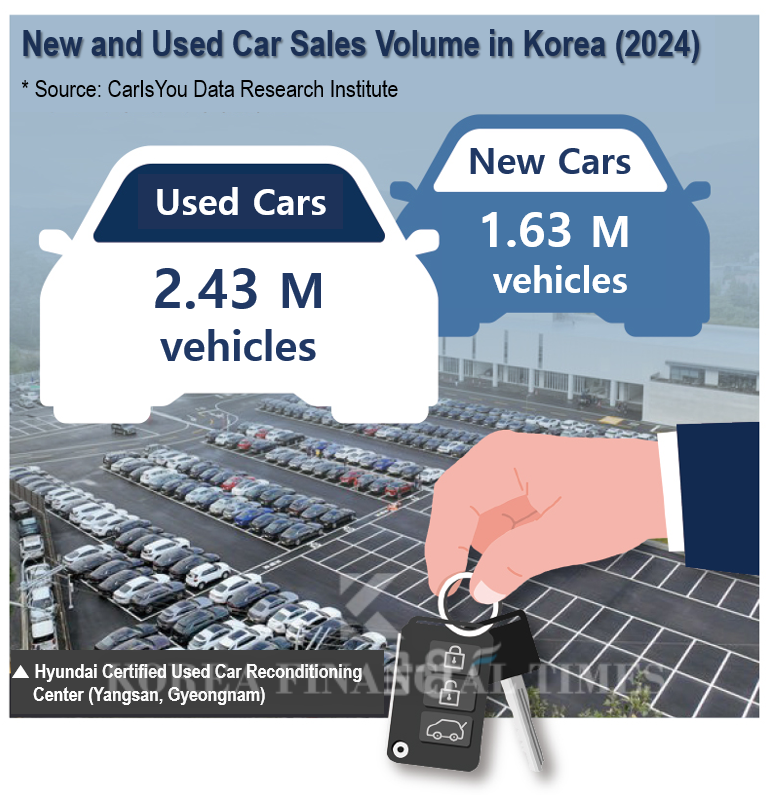






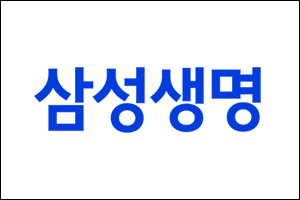

















![[기자수첩] ‘원금 보장·투자 수익' IMA 가입해보니](https://cfnimage.commutil.kr/phpwas/restmb_setimgmake.php?pp=006&w=69&h=45&m=5&simg=2026011802554705191dd55077bc25812315214.jpg&nmt=18)










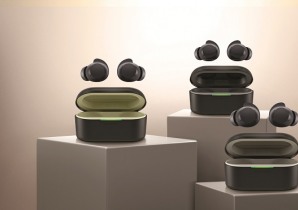
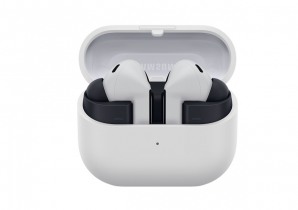
![[카드뉴스] 하이퍼 인플레이션, 왜 월급이 종잇조각이 될까?](https://cfnimage.commutil.kr/phpwas/restmb_setimgmake.php?pp=006&w=298&h=298&m=1&simg=202601141153149784de68fcbb3512411124362_0.jpg&nmt=18)
![[카드뉴스] 주식·채권·코인까지 다 오른다, 에브리싱 랠리란 무엇일까?](https://cfnimage.commutil.kr/phpwas/restmb_setimgmake.php?pp=006&w=298&h=298&m=1&simg=202601071630263763de68fcbb3512411124362_0.jpg&nmt=18)
![[카드뉴스] “이거 모르고 지나치면 손해입니다… 2025 연말정산 핵심 정리”](https://cfnimage.commutil.kr/phpwas/restmb_setimgmake.php?pp=006&w=298&h=298&m=1&simg=202601061649137526de68fcbb3512411124362_0.jpg&nmt=18)
![[카드뉴스] KT&G, 제조 부문 명장 선발, 기술 리더 중심 본원적 경쟁력 강화](https://cfnimage.commutil.kr/phpwas/restmb_setimgmake.php?pp=006&w=298&h=298&m=1&simg=202509241142445913de68fcbb3512411124362_0.png&nmt=18)
![[카드뉴스] KT&G ‘Global Jr. Committee’, 조직문화 혁신 방안 제언](https://cfnimage.commutil.kr/phpwas/restmb_setimgmake.php?pp=006&w=298&h=298&m=1&simg=202503261121571288de68fcbb3512411124362_0.png&nmt=18)
![[신간] 고수의 M&A 바이블](https://cfnimage.commutil.kr/phpwas/restmb_setimgmake.php?pp=006&w=81&h=123&m=5&simg=2025091008414900330f8caa4a5ce12411124362.jpg&nmt=18)
![[신간] 리빌딩 코리아 - 피크 코리아 극복을 위한 생산성 주도 성장 전략](https://cfnimage.commutil.kr/phpwas/restmb_setimgmake.php?pp=006&w=81&h=123&m=5&simg=2025032814555807705f8caa4a5ce12411124362.jpg&nmt=18)
![[서평] 추세 매매의 대가들...추세추종 투자전략의 대가 14인 인터뷰](https://cfnimage.commutil.kr/phpwas/restmb_setimgmake.php?pp=006&w=81&h=123&m=5&simg=2023102410444004986c1c16452b0175114235199.jpg&nmt=18)

![[신간] 이게 화낼 일인가?](https://cfnimage.commutil.kr/phpwas/restmb_setimgmake.php?pp=006&w=81&h=123&m=5&simg=2026010610254801367f8caa4a5ce12411124362.jpg&nmt=18)
![[신간] 조금 느려도 괜찮아...느림 속에서 발견한 마음의 빛깔](https://cfnimage.commutil.kr/phpwas/restmb_setimgmake.php?pp=006&w=81&h=123&m=5&simg=20251105082239062852a735e27af12411124362.jpg&nmt=18)

![[AD] 현대차, 글로벌 안전평가 최고등급 달성 기념 EV 특별 프로모션](https://cfnimage.commutil.kr/phpwas/restmb_setimgmake.php?pp=006&w=89&h=45&m=1&simg=20260106160647050337492587736121125197123.jpg&nmt=18)
![[AD] 현대차 ‘모베드’, CES 2026 로보틱스 부문 최고혁신상 수상](https://cfnimage.commutil.kr/phpwas/restmb_setimgmake.php?pp=006&w=89&h=45&m=1&simg=20260105103413003717492587736121125197123.jpg&nmt=18)
![[AD] 기아 ‘PV5’, 최대 적재중량 1회 충전 693km 주행 기네스 신기록](https://cfnimage.commutil.kr/phpwas/restmb_setimgmake.php?pp=006&w=89&h=45&m=1&simg=20251105115215067287492587736121125197123.jpg&nmt=18)
![[카드뉴스] KT&G, 제조 부문 명장 선발, 기술 리더 중심 본원적 경쟁력 강화](https://cfnimage.commutil.kr/phpwas/restmb_setimgmake.php?pp=006&w=89&h=45&m=1&simg=202509241142445913de68fcbb3512411124362_0.png&nmt=18)
![[AD]‘황금연휴에 즐기세요’ 기아, ‘미리 추석 페스타’ 이벤트 실시](https://cfnimage.commutil.kr/phpwas/restmb_setimgmake.php?pp=006&w=89&h=45&m=1&simg=20250903093618029117492587736121166140186.jpg&nmt=18)




